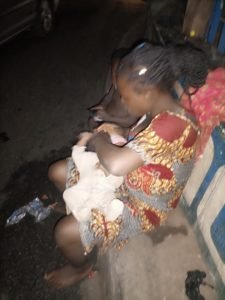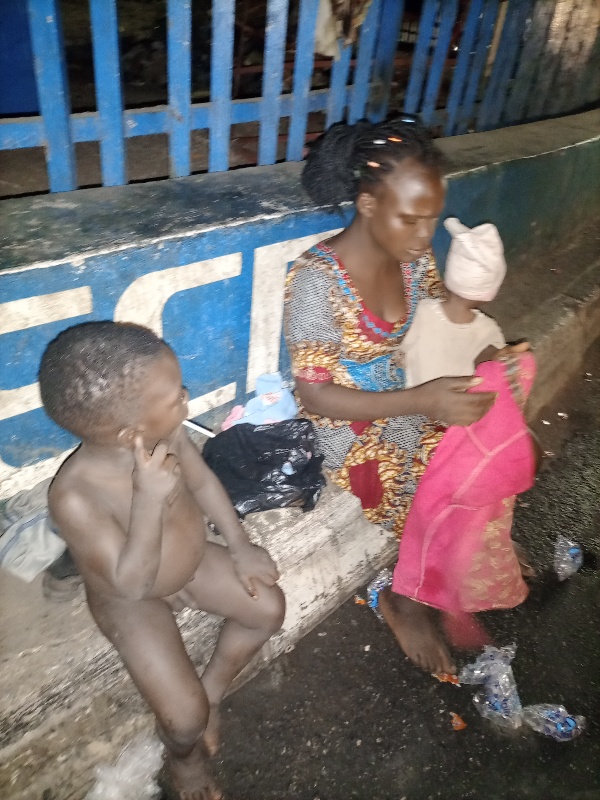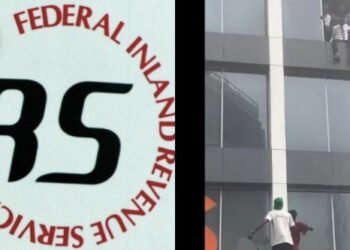Driving from the Basorun area of Ibadan, I sighted a young lady seated at the edge of the roundabout under the Mokola Flyover, at about 9:15pm, on Tuesday.
The lady, who cannot be more than 25 years old, was not the attraction. She was ‘bathing’, with three sachet water, a baby of about eight (8) months old, under the flyover with vehicles, negotiating the roundabout, driving very dangerously close to her.
Also seated beside her was a naked young boy, and in the full glare of people and motorists who were passing by, apparently unconcerned about the three persons and the dangers they were exposed to.
Initially, and like other people, I felt unconcerned, navigated through the heavy traffic at the roundabout and drove towards Post Office, Dugbe, on my way to my house, located at the Wire and Cable end of Apata.
My spirit was, however, troubled by some disturbing questions: How did that young lady got to that place?; Who is responsible for the two children with her? What happens if any of the trio got knocked down by a moving vehicle? What would be their fate if one or all of them become(s) victim(s) of ritualists who are increasingly on the prowl?
These questions made me to have a change of heart. I made a u-turn in front of Dugbe Post Office and headed back to Mokola Roundabout. Still seated there was this young lady. She had finished bathing her baby and was dressing him up in a very filthy overall, while the young boy remained seated beside her, unclothed.
I was afraid to directly approach her for two reasons: One, the fear of passers-by taking me for a prospective ritualist who wanted to lure his would-be victim. Secondly, her mental state of health was unknown. I went to some people who were hawking their articles of trade under the flyover. They assured me that she is harmless and that I can talk to her.
Emboldened by the assurances, I returned to her and a conversation ensued between us, of course, in Yoruba Language. I asked her: What is your name? Who is responsible for the two children? How old are the children? What are you doing under the bridge? Where do you live? What is your profession? Where are your people?
Appearing distraught though, she coherently responded: “My name is Rokiba. I have a husband who is the father of my two children. His name is TK. The first one is about three years old and the second one is less than one year old.
“I always come under the bridge [the Mokola Flyover] to beg for money to feed myself and my children. I am a hairdresser by profession, but I survive by coming here under the bridge to beg for money.
“I am living at Oniyanrin, but I come here everyday to beg for money. I sometimes make between N1000 and N2000 daily. I will get to this place in the late afternoon and leave for my house at about 9:30pm or 10pm.”

When I asked her if she is not afraid of the dangers she is exposing herself and her children to, she simply shrugged her shoulder and kept mum. She was also silent on the whereabout of any member of her family.
Not seeking to over-stretch my luck, I did not ask her further questions. Rather, I spoke with some of the people selling under the flyover. Directly opposite where Rokiba was seated was a young man whose articles of trade were fairly used (tokunbo) shoes and a lady.
The two respondents affirmed that Rokiba has been a regular face under the flyover for more than two years. They further said her mother is always around the place and she is also into begging. Efforts to locate Rokiba’s mother were futile as I learnt that she probably have ‘closed’ for the day.
However, the lady respondent volunteered more information as she disclosed: “That lady you are seeing over there is not a new face here. I even wonder why you have not been seeing her around here. She has been coming here for more than two years.
“Her husband [Rokiba’s] is a commercial okada rider. He comes here in the evenings to collect money from her. Sometimes, he will beat her, saying he does not want her to stay under the bridge. But he will collect her money and leave her there.
“She has been coming here since when the first child was born over two years ago. She would come here at about 3pm-4pm in the afternoon, to beg for money, and leave between 9:30pm and 10pm.
“Another strange thing about that lady is that she left here when she was pregnant and returned immediately after she had the second baby, and for the same man.
“Her mother is also always around here, begging for money. She used to carry a baby on her back too. If you look around, you can still be fortunate to see her, but she may have closed for the day,” she said.
When I told the lady that Rokiba’s story may, henceforth, change for better, she retorted: “Oga, I don’t think you can do anything to change her situation. Many of the police officers here at the Mokola Police Station know about her and they did not do anything.”
Here comes the challenge for the Oyo State government, under the leadership of Governor ‘Seyi Makinde. The present administration has been making concerted efforts to rid Ibadan, the state capital, of destitutes and beggars.

Hence, the Akinyele Resettlement Centre at Moniya was established for the relocation and rehabilitation of beggars and destitutes constituting eyesores at various locations within the Ibadan metropolis.
Just Wednesday, last week, the state Commissioner for Women Affairs and Social Inclusion, Alhaja Kafilat Olayiwola, led her team to evacuate some 400 ‘stubborn’ beggars and destitutes who strayed from the resettlement centre and found their back to the streets.
The beggars and destitutes were evacuated from Jemibewon, Mokola, Sango, University of Ibadan Main Gate, Challenge, Oja’ba, Oje, Bodija, Iwo Road, Gbagi and Basorun Akobo axis.
Alhaja Olayiwola had reportedly said: “The government of the day is not interested in seeing destitutes and beggars on our roads without being fed and looking battered…”
Beggars and destitutes are the ‘children’ and responsibility of the state government. The Commissioner for Women Affairs attested to this fact when she said: “The destitutes and beggars in Oyo State need care, affection, rehabilitation and resettlement. All these have been taken care of by the state government.”
Alhaja Olayiwola had also said stubborn ones would be evacuated, rehabilitated and eventually be reunited with their families. To get this done, she said her ministry’s officials would be carrying out regular raids of their locations, both during official hours and in the evenings.
Rokiba and her two children can be said to be ‘children’ of Governor Makinde. She belongs to the category of the stubborn beggars who have refused to leave the street; she is also plying her trade in the evenings, and at Mokola, a location very close to the Office of the Governor.
Can the state government pick up the gauntlet and save Rokiba and her two young children from the dangers inherent in staying under the Mokola Flyover where there is heavy vehicular traffic? Can Governor Seyi Makinde act and save his ‘child’, Rokiba, and his ‘grandchildren’ (her two young children) from being potential victims of marauding ritualists and other criminals?
Taking Rokiba off the street would further lend credence to the avowed determination of the Governor Makinde-led administration to rid the state capital of destitutes and beggars.
More importantly, such a timely intervention will definitely save Rokiba and her children from the dangers lurking under the ever-busy Mokola Flyover.
And lastly, the two young ‘grandchildren’ of Governor ‘Seyi Makinde, if they manage to escape from the aforementioned dangers, but unattended to, will definitely grow up to constitute a nuisance to the society and thus defeating the very essence of the drive by the administration to rid the state of miscreants, beggars and destitutes.
ALSO READ: Seyi Makinde Rescues His’ Child’, Rokiba, From Under Mokola Flyover





























